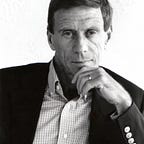Hands first, then minds
Lending a hand can help us to connect
I was driving home on the freeway when a motorcycle screamed past. Ahead, a van and a big rig were traveling side by side, and the motorcycle streaked into the narrow canyon between them. (Lane splitting is legal in California). It clipped one of the trucks and ricocheted between the two, sending the rider airborne at 90 miles per hour. He sailed high into the air and hit the freeway, bouncing to a stop, face down.
I got stopped twenty feet short of the body. Behind me, cars braked to a stop. I flung open my door and ran to the rider. He was wearing a thick black motorcycle jacket, jeans, and a full face helmet with a tinted shield. I could not see his face. He wore one running shoe; the other was lying in the next lane. From the absolute stillness of the body, I knew he was dead. The motorcycle lay on its side a hundred yards ahead. A pool of blood spread silently from under his body.
A curiosity slowdown developed in the oncoming lanes, and some people stuck phones out their windows to record the scene. When the paramedics arrived, one of them used trauma shears to cut through the jacket, and another opened a case and attached electrodes to the victim’s chest. Then they covered the body with a plastic sheet.
That night images played on a loop in my head — the motorcycle bouncing between the two trucks, the rider vaulting into the air, his body lying face down on the freeway, the dark blood pooling on the asphalt. I wondered what had flashed through his mind in the two seconds before everything went black. The next day I learned on the internet that he was thirty-three with a wife and son. A few days later I found details on the funeral arrangements. I decided to go.
On the day I drove to the church, I felt nervous. Everyone processes grief and trauma differently; maybe his family would find my presence intrusive or weird. They might take me for a prying journalist or a personal injury attorney on the prowl. This was not an easy mission for an introvert. When I saw people standing on the church lawn, I wanted to turn around and drive home. Inside the church I found his aunt and explained who I was. I thought the family might have been tormented by visions of him alone on the freeway, shaking in agony, and I wanted them to know that he had not suffered. Beyond that, I felt that as the first person to reach his soulless body, I had entered his orbit and now should do this to complete the circle.
His aunt was welcoming and appreciative. She told me that his family knew little of the accident details and did indeed worry that he had suffered. She introduced me to his mother and then his young wife sitting immobile before the open casket. I assured them that he had not suffered. I saw his face for the first time, as waxy and unreal as every corpse I’ve ever viewed. The three year-old son scampered around the church like a traumatized puppy. I could not stifle a flash of anger that a man with a wife and child would ride so recklessly.
The aunt thought his friends in the motorcycle club would want to meet me, so I was led to group of men clustered around their motorcycles on the street. They were bearded, long-haired, sun baked, and dressed in leather, hanging around their bikes in a thick cloud of marijuana smoke. When the aunt told them who I was and why I had come, they seemed moved that I had stopped on the freeway and now come to the church, as if it made me one of them. They were not put off by my combed hair, dress shirt, and blazer. I got lots of rough hugs.
All of this happened two and a half years ago. I remembered it when President Biden in his inaugural address spoke of times when we need a hand and times when we can lend a hand. I grew up in a small town in Kentucky, surrounded by helping hands, and I now live a metropolitan sprawl of six million. Such size can breed anonymity, isolation, hostility, and loneliness. For every person we know there are a million we don’t. Separation seems our natural state.
Sometimes from the massive crowd an individual crosses our path. Rodney King’s pleading question echoes from three decades ago. “Can’t we all just get along?” I don’t know. But with Trump finally behind us, the hope for bridging our deep and angry differences may lie in joining hands first, resolving our debates later. Lending a hand, whether to a friend or a stranger, connects us, even when politics or religion or beliefs do not. No single helping hand is a panacea, but it’s a start.
Bill Smoot teaches at Mount Tamalpais College at San Quentin Prison.
